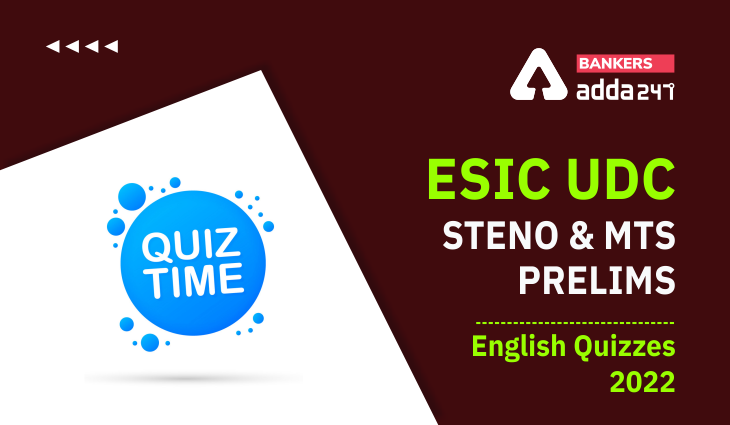Directions (1-5): Rearrange the following six sentences (A), (B), (C), (D), (E) and (F) in the proper sequence to form a meaningful paragraph and then answer the questions given below.
A. If India has emerged as one of the tall nations of the world, a citadel of democracy and a super-economy in the offing,
B. Patel effectively prevented the Balkanisation of India and achieved it without civil unrest, bloodshed or rebellion.
C. Hard-won independence came with many problems such as communal riots and a refugee crisis.
D. it has been significantly due to Sardar Patel’s non-violent silent revolution in enabling the ‘political integration’ of princely states with the Indian Union.
E. A grateful India must salute the Iron Man.
F. It is well known that Patel had differences with Nehru but he never allowed them to surface so as to affect nation building.
Q1. Which of the following would be the FIRST sentence after rearrangement?
(a) F (b) B (c) C (d) D (e) A
Q2. Which of the following would be the FIFTH sentence after rearrangement?
(a) D (b) F (c) C (d) B (e) E
Q3. Which of the following would be the THIRD sentence after rearrangement?
(a) C (b) D (c) B (d) F (e) A
Q4. Which of the following would be the FOURTH sentence after rearrangement?
(a) E (b) F (c) C (d) D (e) B
Q5. Which of the following would be the LAST (SIX) sentence after rearrangement?
(a) C (b) F (c) B (d) D (e) E
Directions (6–15): Read each sentence to find out whether there is any grammatical error or idiomatic error in it. The error, if any, will be in one part of the sentence. The number of that part is the answer. If there is no error, the answer is (E). (Ignore errors of punctuation, if any.)
Q6. The fact that the compact (a)/ car is better than conventional cars (b) / has been proved (c)/ by its sales.(d)/ No error (e)
(a) a
(b) b
(c) c
(d) d
(e) e
Q7. One of my friend (a)/ came running to (b)/ me and gave (c)/ me this good news. (d)/ No error. (e)
(a) a
(b) b
(c) c
(d) d
(e) e
Q8. There is no doubt (a)/ that the majority of workers (b)/ is in favour (c)/ of increasing the wages. (d)/ No error. (e)
(a) a
(b) b
(c) c
(d) d
(e) e
Q9. Just before the race (a)/ I asked him (b)/ whom he thought (c)/ was going to win. (d)/ No error. (e)
(a) a
(b) b
(c) c
(d) d
(e) e
Q10. People have a right (a)/ to criticize but at the (b)/ same time each of them (c)/ have to remember the duty also.(d)/ No error. (e)
(a) a
(b) b
(c) c
(d) d
(e) e
Q11. Being a Sunday (a)/ he went out (b)/ for a trip to Pune (c)/ with his family. (d)/ No error. (e)
(a) a
(b) b
(c) c
(d) d
(e) e
Q12. No one in (a)/ the locality (b)/ is as intelligent (c)/ as Ashok is. (d)/ No error. (e)
(a) a
(b) b
(c) c
(d) d
(e) e
Q13. If I was you (a)/ I would have told (b)/ the Chairman to keep (c)/ his mouth shut. (d)/ No error. (e)
(a) a
(b) b
(c) c
(d) d
(e) e
Q14. The soldier said firmly (a)/ that he would rather starve (b)/ than stealing (c)/ to get what he needed. (d)/ No error. (e)
(a) a
(b) b
(c) c
(d) d
(e) e
Q15. We should drink (a)/ several glasses of the water (b)/ daily (c)/ if we want to remain healthy. (d)/ No error. (e)
(a) a
(b) b
(c) c
(d) d
(e) e
Solutions
Sol. (1-5)
For questions the correct sequence is ADCBFE.
S1. Ans.(e)
S2. Ans.(b)
S3. Ans.(a)
S4. Ans.(e)
S5. Ans.(e)
S6. Ans. (e)
Sol. The sentence is grammatically correct.
S7. Ans. (a)
Sol. ‘friends’ will be used in place of ‘friend’ as nouns or pronouns is always plural when used after ‘one of, either of , neither of, every one of’.
Ex. One of the boys.
S8. Ans. (c)
Sol. Use ‘are’ in place of ‘is’ as ‘The majority of’ +Noun (plural) or Pronoun (plural) + Verb (Plural) is used.
Ex. The majority of the students favour him.
S9. Ans. (c)
Sol. ‘who’ will be used in place of ‘whom’ as verb is not used after ‘whom’ in objective case.
Ex. Just before the race I asked him who was going to win.
S10. Ans.(d)
Sol. ‘has’ will be used in place of ‘have’ as after ‘each of, either of, neither of, everyone of’, noun or pronoun used in the sentence is always plural but verb is always singular.
Ex. Each of the boys comes late.
S11. Ans. (a)
Sol. Use ‘it’ before ‘being’ as for every participle, there must be one subject of reference.
Ex. It being a fine morning, we went out for a walk.
S12. Ans. (e)
Sol. The sentence is grammatically correct.
S13. Ans. (a)
Sol. Use ‘were’ in place of ‘was’ as is ‘to be’ is used to express unfulfilled wish, condition, desire of present, then ‘were’ is used.
Ex. If I were a bird, I would fly.
S14. Ans. (c)
Sol. ‘steal’ will be used in place of ‘stealing’ because ‘would rather+ V1+ than+ V1’ is used.
Ex. I would rather sing than dance.
S15. Ans. (b)
Sol. ‘the’ will not be used before ‘water’ as no article is used when ‘water’ is used in comprehensive form.
Ex. We cannot live without water.
Click Here to Register for Bank Exams 2022 Preparation Material





 GA Capsule for SBI Clerk Mains 2025, Dow...
GA Capsule for SBI Clerk Mains 2025, Dow...
 The Hindu Review October 2022: Download ...
The Hindu Review October 2022: Download ...
 Delhi CSIR CRRI Recruitment 2025 Notific...
Delhi CSIR CRRI Recruitment 2025 Notific...







